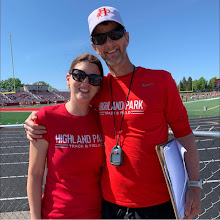That gave me hope. However, after Sunday’s race, I’d swear that there is a magical switch in my body and it’s been turned off. Paces that I could easily run for a half marathon in the middle of winter off of base training just a couple of years ago are now a struggle to maintain for 10K.
Sunday I ran the Hennepin Lake Classic 10K and had to sprint* to break 40 minutes. My splits ended up being 6:20, 6:24, 6:27, 6:27, 6:36, 6:26, 1:17 and my 5K splits were 19:52/20:05 for a 39:57.
*I thought I was sprinting until I watched the leaders of the 5K race.
After running 39:15 at Get in Gear in April, this is more than a little frustrating. And it leads to a whole bunch of questions;
Is my new training program working or not?
Is this program too much for me? Am I overtraining? Do I need to do fewer workouts?
Do I just not respond well to VO2 workouts? Did Friday’s hill workout leave me tired?
Am I on the right path for a marathon?
If I truly run well just off of a lot of base miles, should I just go back to that type of training?
Is all of this just a matter of getting older?
I know Hudson has a section for Masters in his book. At 39-years-old and 11 months, I didn’t think I needed to read it. Now I do.
And I think I’ll have to start paying attention to Joe Rubio’s Masters Plan;
The good news is that I feel fine and I’m not hurt or sore – just slow(er).1) Take your recovery days easier - take them seriously.
2) Do less hard sessions each week than when you were younger. Do less within each hard session.
3) You can be "on" occasionally, so best pick the times you want to hammer wisely.
4) It takes longer to get in shape as a masters athlete. And it takes much less time to fall out of fitness than 20 years ago [or 30 ... or 40].
5) Injuries take an eternity to get over, and there seem to be many more of them along the way. If you can stay healthy, you are way ahead of the game.
6)Family first, career second, running third, beer a close fourth.
7)Masters racing is all about fun and friendships.
Quote of the Day;
“You have to hate to lose, more than you love to win.” - unknown

6 comments:
Best line EVER
Family first, career second, running third, beer a close fourth.
I'm not a Master yet but I'm going with this plan...Then when I do turn 40 my body will be ready for the beer!
Give your self some credit- you are still very, very fast. It's all I can do to break at 10 minute mile, so enjoy your speed. Congrats on a great race!
9 questions in a row about training... I'd answer, but that much coaching requires a paycheck. The simple answer: April is not August.
Rubio's right about all except #7. No one says it's for fun and friendship until they lose.
Hmm, I think you're body is already acclimated to beer.
Beth, speed is all relative. If you ran 10 minute miles last year and then ran 10:30 pace this year - after training just as hard - would you be happy?
Steve, I realize April is not August. Shouldn't I be faster in August - especially after skiing all winter. It's not like I can use the weather as an excuse.
Actually, what I had in mind was that in April you weren't thinking "marathon" as much. The furhter you get into marathon training, the further you get from 10K racing speed.
April was 2 months before Grandma's.
August is 2 months before Whistlestop.
Post a Comment